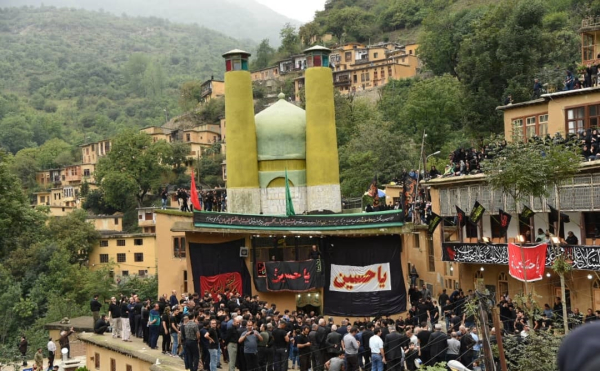 President Hassan Rouhani here on Tuesday called on Muslims to show unity and confront "unprecedented" threats against them.
President Hassan Rouhani here on Tuesday called on Muslims to show unity and confront "unprecedented" threats against them.
Addressing visiting MPs from Muslim countries at the Inter-Parliamentary Union in Tehran, Rouhani said the "multifaceted" threats against Iran would eventually have a negative impact on all Muslim nations.
Rouhani attacked the occupying regime of Israel, saying that the "Zionist regime" gains the most benefit from the current upheaval in the Muslim world.
The Iranian president condemned using violence against Muslims in the name of anti-terror activities.
He noted that Iran has proposed a resolution on a global confrontation with violence and extremism, which has been approved in the United Nations General Assembly.
The Iranian president also referred to the plight of the Syrian refugees as well as the Israeli aggression against Palestinians, noting that the Muslim world needs unity and solidarity to tackle these challenges.
The Iranian president called on Muslim nations to adhere to and put into practice Islamic teachings in order to deal with the wide-scale problems they face.
The president expressed hope that the IIPU meeting would provide an opportunity for further mutual understanding and cooperation among Islamic states.
Fighting extremism, challenges to democracy in Islamic nations, technical and scientific cooperation as well as the issue of Palestine are the main topics on the agenda of the IIPU meeting.
Rouhani also said sanctions imposed on Iran over its nuclear program will hurt the West as well as the Islamic Republic.
"Fire, war-mongering and the frustration of human beings are result of the sanctions,” Rouhani said. He said the “fire” would also damage the countries that impose them.
The Iranian president later met Turkey Parliament Speaker Cemil Cicek, saying the Islamic Republic and Turkey enjoy “positive and growing” relations.
“Iran has been expanding relations with Turkey in different fields over the past months,” Rouhani said.
He added that Tehran and Ankara reached good agreements during Turkish Prime Minister Recep Tayyip Erdogan’s visit to Iran in late January and expressed hope the accords would help the two countries improve ties.
The Turkish premier paid a visit to Tehran in late January at the head of a high-ranking delegation and held talks with senior Iranian officials on key bilateral and regional issues.
Cicek, for his part, said important decisions have been made during Erdogan’s visit to Tehran and expressed his country’s determination to implement the agreements at the earliest.
The Turkish parliament speaker added that Iran and Turkey play a key role in the region and should make efforts to resolve many problems that the Muslim world is faced with.
If Muslims refrain from trying to settle the Muslim world’s woes, foreign countries will intervene in their affairs, he said.
Iran and Turkey have already announced that they are determined to increase the value of bilateral trade exchange to $30 billion by 2015.
The ninth meeting of the Islamic Inter-Parliamentary Union (IIPU) opened here with representatives from nearly 50 countries in attendance.
Sudanese National Assembly Speaker Al-Fateh Ezzedin addressed the inauguration as the president of the Islamic organization which he handed over to Iran.
Ezzedin stressed that Islam is not the religion of extremism, calling for stronger unity among Muslim nations. He also emphasized the need for the enhancement of political and economic relations between the IIPU member states.
Iranian Majlis Speaker Ali Larijani said the Islamic Republic is determined to continue its nuclear negotiations with six world powers with “vigilance”.
In his address to the meeting, Larijani criticized the Western powers for adopting an “adventurist” approach toward Iran’s nuclear issue, stressing, however, that the Islamic Republic is set to “vigilantly pursue the path of nuclear negotiations”.
The Iranian Majlis speaker stated that the Western powers are well aware that Tehran’s nuclear energy program has not diverted from its peaceful path under the supervision of the International Atomic Energy Agency (IAEA), adding, “But they have been dealing with Iran’s nuclear dossier in an adventurist manner.”
Elsewhere in his comments, the Iranian Majlis speaker touched upon the issue of terrorism, saying the arrogant powers make “tactical” use of “terrorism” in order to threaten the Muslim nations in different countries such as Syria, Iraq, Afghanistan and Pakistan.
Larijani also hailed the recent wave of Islamic Awakening in regional Muslim countries, stressing that such democratic movements would strengthen unity and convergence in the Islamic Ummah.
Some 28 parliament speakers and 47 parliamentary delegations are taking part in the meeting, which has been underway in Tehran since February 14.
Fighting extremism, challenges to democracy in Islamic nations, technical and scientific cooperation as well as the issue of Palestine are the main topics on the agenda of the IIPU meeting.
The IIPU was established in 1999 based on an initiative by Iran. It seeks to strengthen parliamentary cooperation among Islamic countries in order to solve challenges facing the Islamic world.
The eighth meeting of IIPU was held in the Sudanese capital, Khartoum, on January 21-22, 2013.

















